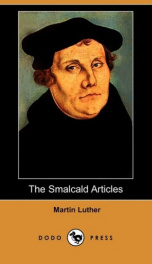The Smalcald Articles

Martin Luther (1483-1546) was a German theologian, an Augustinian monk, and an ecclesiastical reformer whose teachings inspired the Reformation and deeply influenced the doctrines and culture of the Lutheran and Protestant traditions. Luther's call to the Church to return to the teachings of the Bible led to the formation of new traditions within Christianity and to the Counter-Reformation, the Catholic reaction to these movements. His contributions to Western civilization went beyond the life of the Christian Church. His translations of the Bible helped to develop a standard version of the German language and added several principles to the art of translation. His hymns inspired the development of congregational singing in Christianity. Three of his best known works were published in 1520: To the Christian Nobility of the German Nation, On the Babylonian Captivity of the Church, and Concerning Christian Liberty. Other works include: Concerning Confession (1521), Against the Murderous, Thieving Hordes of Peasants (1525), On the Jews and Their Lies (1543), On the Holy Name and the Lineage of Christ (1543) and Against the Papacy at Rome Founded by the Devil (1545).
Info about the book
Author:
Series:
Unknown
ASIN:
B003YJF2NY
Rating:
3/5 (4)Your rating:
0/5
Languge:
English
Users who have this book
Users who want this book
What readers are saying
What do you think? Write your own comment on this book!
write a commentif you like The Smalcald Articles try:
Other books by this author
Do you want to exchange books? It’s EASY!
Get registered and find other users who want to give their favourite books to good hands!


